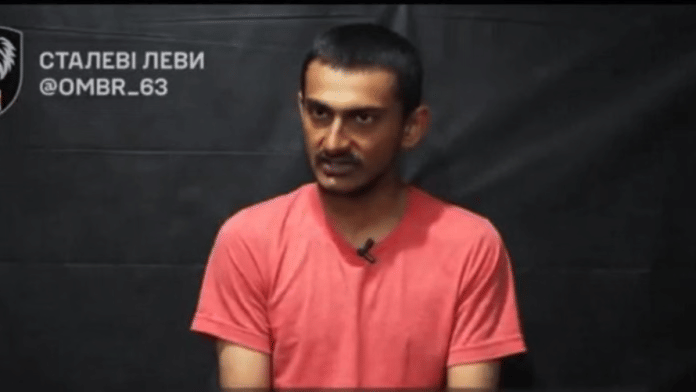New Delhi: India has requested consular access from the Ukrainian government for Majoti Sahil Mohamed Hussein, a 22-year-old man who surrendered last seek after being sent to the frontlines by Russia.
Hussein is the first potential case of an Indian captured in the almost four-year long war between Russia and Ukraine. Kyiv has not formally communicated his capture to the Indian side as it continues to verify his identity. However, sources informed ThePrint that informally there is an understanding within the Indian side that Hussein appears in the records held by its mission in Moscow.
Hussein’s capture was first announced by Ukraine’s 63rd Mechanised Brigade on 7 October. It could be the first documented case of an Indian prisoner of war captured by Kyiv’s armed forces. If he is officially acknowledged as an Indian national, it would add a certain complexity for any potential negotiation for his return.
ThePrint has learnt that India’s embassy in Kyiv is awaiting the formal communication from Ukrainian authorities along with the granting of consular access. A video of Hussein was released by the 63rd Mechanised Brigade last week, which detailed his identity and his situation.
Hussein in the video posted on the messaging application Telegram, identified himself as a resident of Morbi in the state of Gujarat and was sentenced to seven years to a Russian prison on drug-related charges. The 22-year old individual claimed that Russian authorities offered him an opportunity to avoid any further punishment by signing a contract with its military forces.
The Gujarat Police last week confirmed after a preliminary investigation that Hussein travelled to Russia for studies and was arrested and jailed on drug-related charges, according to reports.
Hussein was purportedly given roughly two-weeks of training before being sent to the frontlines on 1 October. Roughly 72 hours later, he surrendered to the Ukrainian armed forces.
As a prisoner of war, his fate remains in the hands of both the Russian and Ukrainian governments for the foreseeable future. Hussein’s story is a part of over 120 other Indians who have been a part of the Russian military, whether through false advertising or willingly signing up to fight in the frontlines in Eastern Ukraine.
India has raised the matter at the highest levels in Moscow. Prime Minister Narendra Modi discussed it with President Vladimir Putin during his visit to Moscow last July. At least 12 Indians have been killed on the frontlines, while close to a 100 returned to India. The recruitment of Indians took place heavily in 2023 and early 2024.
Both Russia and Ukraine have recruited foreigners to fight for their respective militaries. Individuals from countries like Nepal, Sri Lanka and a number of African nationals have all signed up and fought with the Russian military apart from Indians.
Similarly, Ukraine maintains its international legions. Other formations in the Ukrainian military including the 3rd Assault Brigade, 60th Separate Mechanised Brigade, Tormenta Hispana and Compania Serpente also include foreign nationals amongst its ranks.
India has warned its citizens from joining the Russian military, calling such a decision “fraught with danger.” There have been instances of Indians being forced onto the frontlines based on false promises after signing onto the Russian armed forces.
Also Read: ‘Took up Kalashnikovs to defend human rights’—Ukraine’s Maksim Butkevych on time as Russia’s PoW
Understanding Hussein’s status
Once Hussein has been verified by Kyiv as an Indian national and accordingly transferred to a prisoner of war (PoW) centre, New Delhi’s embassy in Ukraine could receive consular access. However, he will likely remain a Russian PoW in Ukraine.
The Geneva Conventions that govern the law of war have specific clauses that highlight that volunteer fighters captured by a country can be considered a prisoner of war.
Kyiv has a few hundred foreign PoWs in its custody, however the exact number is not publicly disclosed. Russia reportedly has thousands of Ukrainian PoWs, a number that is not publicly available. Since the start of the full-scale war in February 2022, exchanges of PoWs are one of the few remaining lines of communication between Kyiv and Moscow.
However, PoW exchanges between Ukraine and Russia do not have a fixed mechanism. Often it is a one-for-one exchange—one Russian PoW for one Ukrainian PoW. Moscow has rejected Kyiv’s attempts to conduct an all-for-all exchange, which would see all PoWs held by both sides exchanged in one go.
In recent months, especially after US President Donald Trump returned to power in the US, Russia and Ukraine have conducted fairly large PoW exchanges. As a part of the exchanges, Ukraine has in the past sought the return of foreign nationals that fought under its banner.
However, Russia has rarely made such a request for foreigners that fought alongside its military, and are currently in Ukrainian custody. There are reported cases of two Kazakh nationals who were requested by Russia to be returned during a prisoner swap earlier this year. This is a rare instance, which further complicates Hussein’s fate.
For all purposes, he is a Russian PoW in Ukraine, even if verified as an Indian national, and therefore his return likely relies on Moscow requesting his return.
(Edited by Ajeet Tiwari)
Also Read: 3 Indians are chronicling war in Kyiv through art & aid. They’re making the country proud






